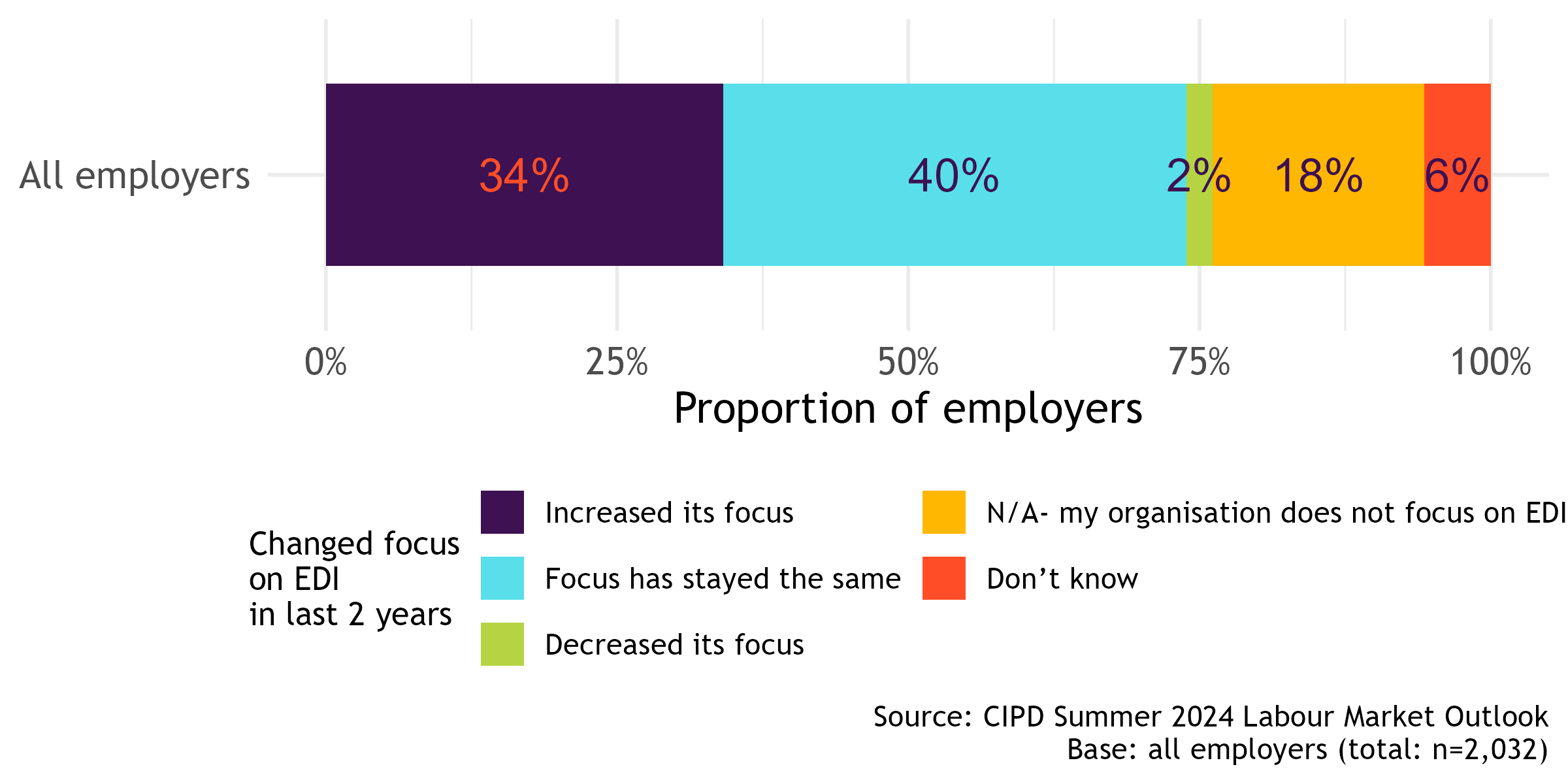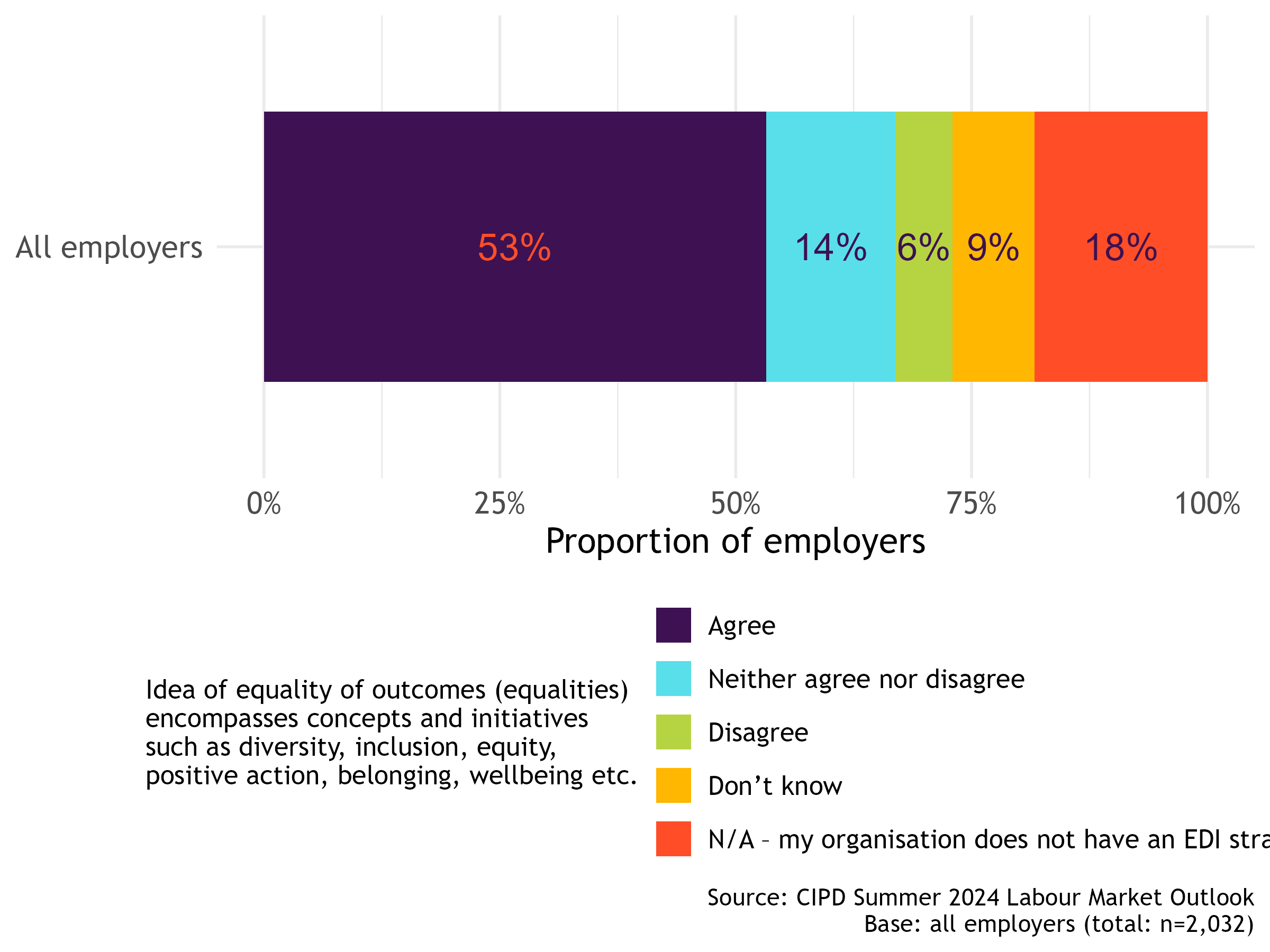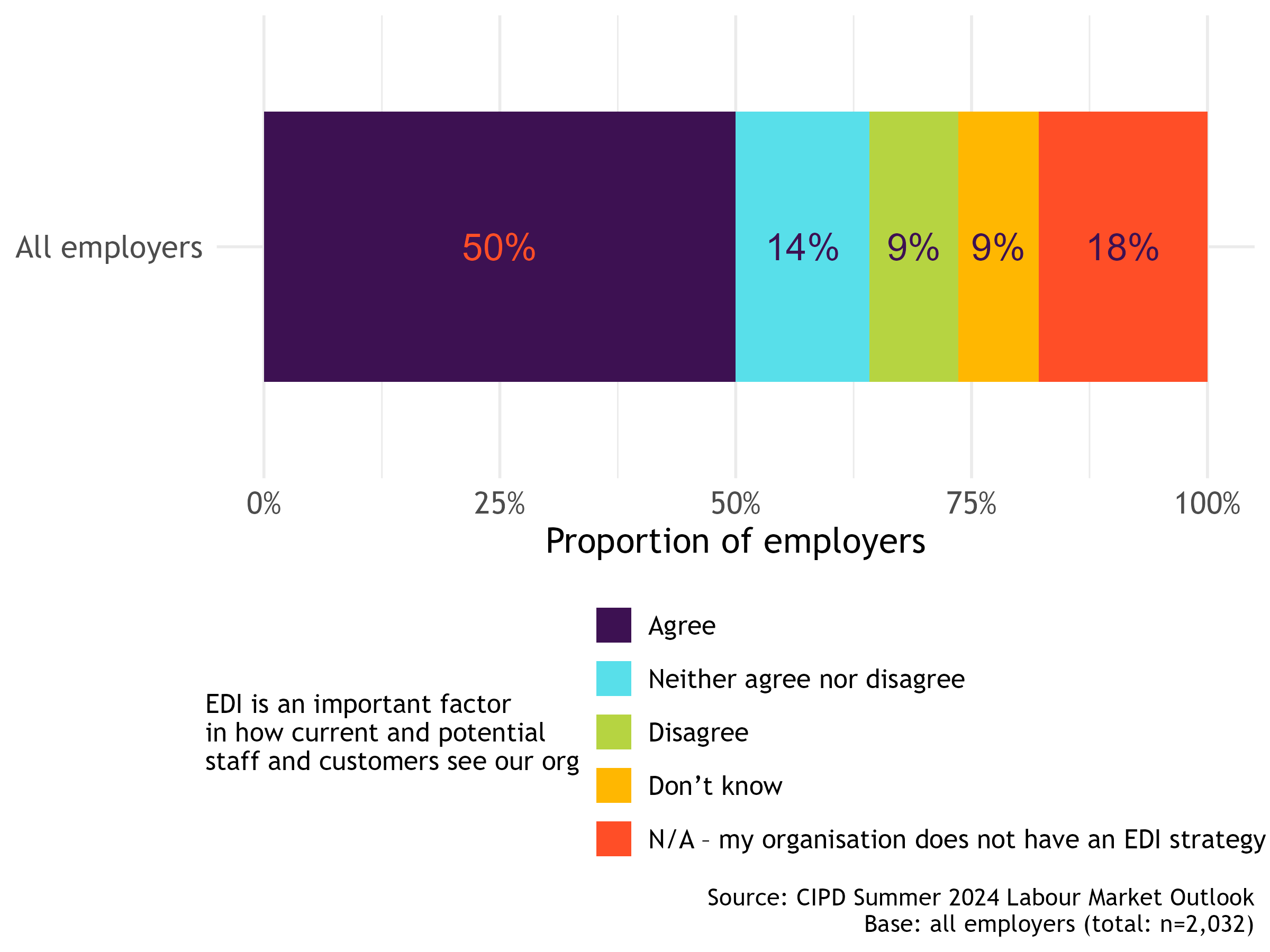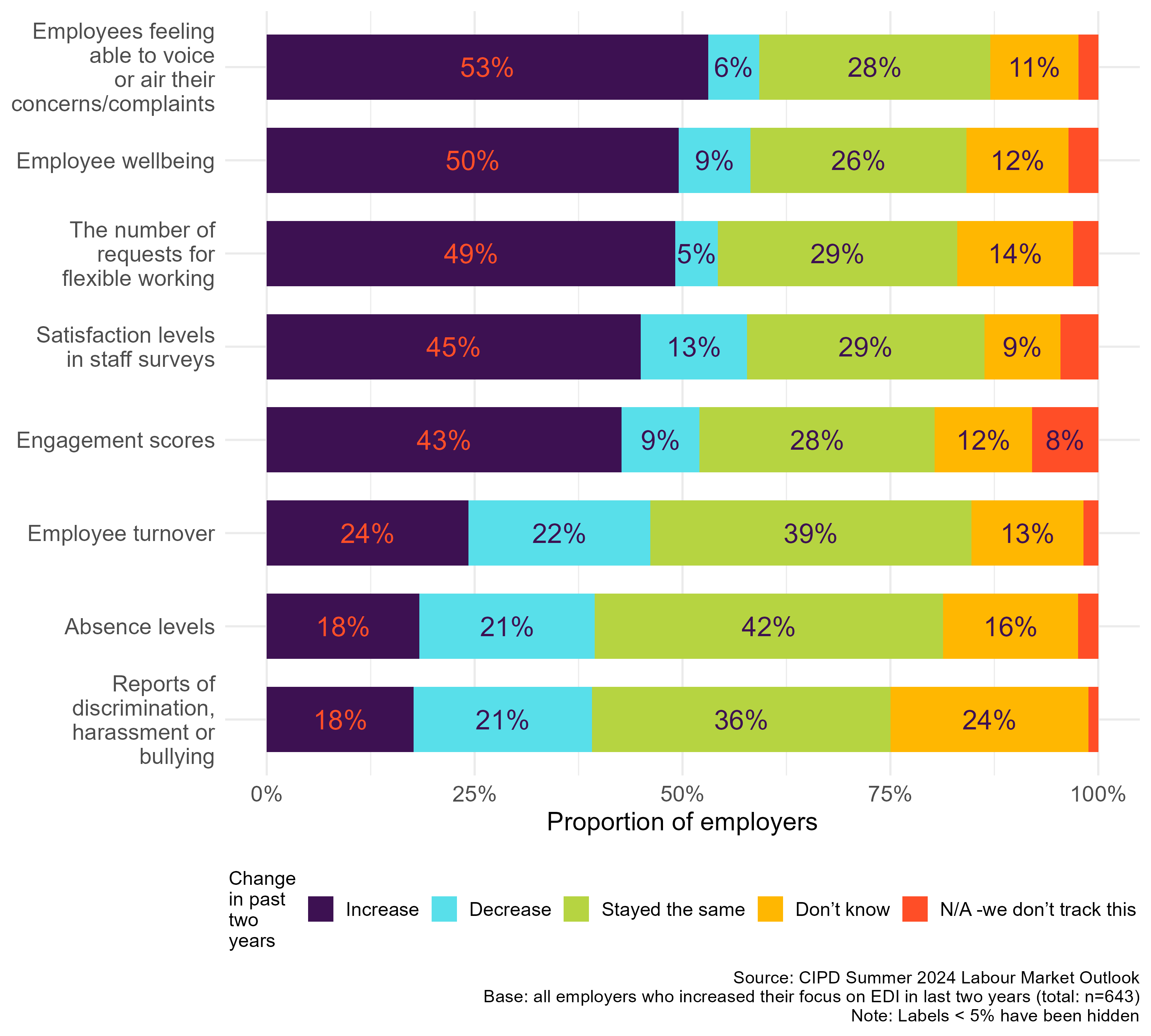Analysis | Future of equality, diversity and inclusion: Employer perspectives
In the context of heightened sensitivity and media rhetoric, we examine recent data from employers to understand the trajectory of the future of EDI
In the context of heightened sensitivity and media rhetoric, we examine recent data from employers to understand the trajectory of the future of EDI
In recent years, equality, diversity and inclusion (EDI) has become the cornerstone of progressive workplace culture. Yet inequalities persist. We have also witnessed heightened media coverage of anti-EDI rhetoric or backlash, with some areas of EDI seemingly intensely politicised and polarising.
To better understand employers’ EDI practice and priorities, we posed some questions in the CIPD’s Labour Market Outlook – Summer 2024 survey*. Has their EDI focus changed? What impact have EDI initiatives had on the workplace? How have they been influenced by external narratives? What does the future hold?
* A representative survey of over 2,000 UK employers.
The results paint a clear picture of the importance of EDI for employers across the board. Despite external pressures and shifting narratives, a significant majority of employers have maintained or increased their commitment to EDI. A mere 2% of employers reported a decreased focus on EDI in the last two years. And although 18% of employers said they did not focus on EDI, a robust 34% had intensified their efforts. Overall, this suggests a growing recognition that EDI is not just a trend but a fundamental aspect of a resilient and thriving workplace.

The majority of those who had decreased their focus on EDI cited reduced staffing and prioritisation as the key reasons. However, this group represents only a small fraction, with the broader trend being that momentum behind EDI continues to build.
Over half (53%) of employers say their organisation believes the idea of equality of outcomes (equalities) encompasses concepts and initiatives such as diversity, inclusion, equity, positive action, belonging, wellbeing and so on. Just 6% disagree with this statement.

One in two employers agree that EDI is an important factor in how current and potential staff and customers see their organisation. This compares to only 9% who disagree with this statement.

Among the organisations that have bolstered their EDI efforts, more than half reported an increase in employees feeling empowered to voice their concerns. This openness is crucial for fostering a culture of transparency and trust. Moreover, these organisations have seen a notable rise in requests for flexible working, employee wellbeing, and overall satisfaction. Such metrics are not only indicative of a positive work environment but are also essential for employee retention and productivity.
An interesting insight from the survey is the relatively neutral impact of EDI efforts on employee turnover and absence rates. This suggests that while EDI efforts enhance job satisfaction and engagement, they do not necessarily translate into immediate uplifts in these areas. Nevertheless, reduced reports of discrimination, harassment, and bullying in 21% of those employers who increased EDI efforts is a clear indicator of the positive shift in workplace culture.

The survey also delved into the influence of external narratives – specifically, the reports of backlash against what some termed ‘wokeness’ (pejorative use). While 9% of employers have critically reviewed their EDI efforts in light of such narratives, a larger portion (22%) have felt compelled to clarify and communicate the importance of EDI within their organisations. This demonstrates that while external pressures exist, they have not significantly derailed the broader EDI agenda. Instead, they have prompted organisations to strengthen their internal communication and commitment to these values.
The survey reveals that strategic business imperative for EDI must be inclusive of the moral, ethical and social responsibilities. Moreover, 45% agreed that a focus on EDI is critical in building organisational resilience – a sentiment echoed by the 43% who prioritised EDI as a key component of their business strategy.
Looking to the future, the path forward for EDI is clear. With 36% of employers surveyed saying that their EDI activities mostly focused on representational diversity, wider equalities of outcomes requires tackling structural inequalities through culture change.
The complexity of EDI language and initiatives remains a challenge, as some employers struggle to integrate them with business priorities and engage with staff, making a strong case for simplifying these concepts and principles. Despite this, the majority of employers remain steadfast in their belief that EDI (equalities) is not only effective but also crucial for future success.
Based on the results from this survey and other participatory research with employers and policy-makers, the CIPD will continue to develop practical support on how organisations can deliver on both equalities and business outcomes.
Browse our A–Z catalogue of information, guidance and resources covering all aspects of people practice.
Discover our practice guidance and recommendations to tackle bullying and harassment in the workplace.

Lutfur joined the CIPD in October 2021 and is a Non-Executive Director for the Business Continuity Institute (BCI). With a career spanning over three decades in the public, private and third sector, Lutfur has championed the delivery of social justice, equality, diversity, inclusion (EDI) and sustainability in organisations enabling them to become more inclusive, greener resilient and employers of first choice.
Prior to joining the CIPD Lutfur worked in a range of roles in the public, private and not for profit sector including: Director of EDI for the Tribal Group PLC (FTSE500), Head of EDI for the Department of Health, Head of EDI for the London Fire and Emergency Planning Authority, Advisor to the Foreign and Commonwealth Office, Advisor to the National College of School Leadership and Associate to the National College of Policing. Lutfur was also Assistant Chief Executive for Tower Hamlets Council where he led the overall transformation programme reshaping the organisations workforce, securing vital partnerships, improving service delivery, and achieving over 30% efficiency savings while protecting front line services. Lutfur served on several Judicial Inquiries and Government Task Forces including the Zahid Mubarak Inquiry, the Prime Ministers Prevent Task Force and the International Ministerial Working Group on Illegal Working.”


Listen to our new fortnightly podcast providing expert insights from HR leaders on the topical issues impacting the world of work
Listen now
What does EDI mean in the workplace and why is an effective EDI strategy vital to business?

How can people teams balance line managers’ need for operational people management support while growing their team’s strategic influence through the HRBP role?

We examine and outline recent research investigating the impact of generative AI tools on the HR profession

We look at how investing in digital technologies, HR skills and culture drive success in restructured people functions

We look at the main focus areas and share practical examples from organisations who are optimising their HR operating model